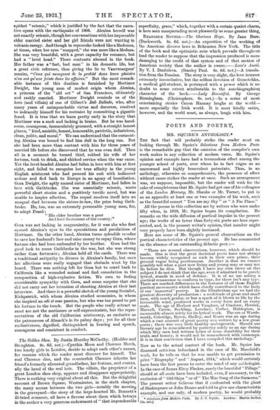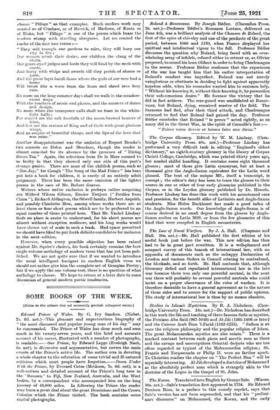POETS AND POETRY,
MR. SQUIRE'S ANTHOLOGY.*
THE fact that will probably strike the reader most on looking through Mr. Squire's Selections from Modern Poets is the remarkable gap that the omission of the compiler's own work makes in any collection of modern verse. Mr. Squire's opinion and example have had a tremendous effect among the younger school of poets, over whom he in fact reigns as an uncrowned and highly benevolent potentate. Thus, in an anthology, otherwise so comprehensive, the presence of effect without cause strikes the reader at once. Such an arrangement was, we suppose, impossible, but the reader will wish for the sake of completeness that Mr. Squire had got one of his colleagues of the London Mercury, Mr. Shanks or Mr. Turner, to put in as an appendix at least one or two examples of his work, such as the beautiful sonnet " You are my Sky " or " A Far Place."
All the poems in this collection are by writers who were under fifty when, in 1919, Mr. Squire began its compilation. He remarks on the wide diffusion of poetical impulse in the present age; the works of no fewer than forty-six poets are here repre- sented, and, in the present writer's opinion, that number might very properly have been slightly increased.
Here are some of Mr. Squire's general observations on the poetical characteristics of the present age. He has commented on the absence of an outstanding didactic poet :—
" There are several observations, however, which should be made. One is that the groat doctrinal poets have not always become widely recognized as such in their own prime, their general vogue being posthumous. Another is that we cannot possibly tell what a poet now living and young may or may not do before he dies. But though I have my own views on this subject I do not think that the age, even if admitted to be purely lyrical, stands in need of defence. It is of no use asking a poetical renascence to conform to type, for there isn't any type. There are marked differences in the features of all those English poetical movements which have chiefly contributed to the body of our `immortal' poetry. In tho Elizabethan age we had the greatest diversity of production : a multitude of great and small men, with much genius, or but a spark of it blown to life by the favburable wind,produced works in every form and on every scale. The age of Herbert and Vaughan, of Crashaw, Herrick, Marvell, Carew, Suckling, Lovelace, eerbet, Habington, is memorable almost solely for its lyrical work. The era of Words- worth, Coleridge, Byron, Shelley, and Keats was an age during which a vast amount of great poetry was written by a few great poets ; there was very little healthy undergrowth. Should our literary age be remembered by posterity solely as an ago during which fifty men had written lyrics of some durability for their truth and beauty, it would not be remembered with contempt. It is in that conviction that I have compiled this anthology.'
Now as to the actual content of the book. Mr. Squire has disarmed criticism beforehand in the case of Mr. Maaefield's work, for he tells us that he was unable to get permission to print " Biography " and " August, 1914," which would certainly have been the first poems to enter the mind of any anthologist. In the case of James Elroy Flecker, surely the beautiful "Pillage" should at all costs have been included, even, if necessary, to the exclusion of " Old Ships " or of " The War Song of the Saracens." The present writer believes that if confronted with the ghost of Shakespeare or John Donne and told to give one characteristic example, and one only, of modem poetry, he would probably • Madams from Modern Poets. By J. C. Squire. London : Martln Becker. las. net.]
choose "Pillage" asthat 'exemplar. Much modern work may remind as of Crashaw, or of Herrick, of Marlowe, of Keats or of Blake, ',but " Pillage " is one of the poems which beam the
modem -stamp with startling sharpness. Let me remind the loader of the first two verses:—
"They will trample our gardens to mire, they -will bury our city in fire ; Our women await. their desire, our-.children the clang of the chain.
Our grave-eyed judges and lordsthervvill bind, by the neck with cords,
And harry, with whips and swords tilt they perish of shame or pain,
And the great lapis lazuli dome where the gods of our race had a home Will break like a wave from the foam and shred into fiery rain.
No mom on the long summer days -shall we walk in the meadow- -sweet ways With the teachers of music and phrase, and the masters of dance and design, No mote, when the • trumpeter calls shall we feast. in the white- light halls ; For stayed are the soft footfalls of the moon-browod bearers of wine, And lost are the statues of Ring and of Gods with groat glorious wings, And an empire of beautiful things, and the lips of the love that: was mine."
Another disappointment was the omission of Rupert Brooke's two solvates on-Helen and Menelaus, though the reader is almost oonsoled :for its absence by the presence • of " Dining Room Tea." Again, the selections from De la Mare seemed to us faulty in that they showed only one side of this poet's
strange genius. There are none of the childish pommel:Judi AS "Jim...Tay," for though "The Song of the Mad. Prince" has been put into a. book for children, it is surely of an entirely adult poignancy. There has been the same, omission of the. lighter poems in the case of Mr. Robert Graves.
Writers whose entire exclusion is perhaps rather surprising
tee Wilfred Wilson Gibson, Eunice Tietjens (" Profiles from China "), Riehard Aldington, the Sitwell family, Herbert Asquith, and possibly Charlotte Mew, among whose works there are at least three or -four short poems which are to be.preferred to an equal number-of: those.printed here. That: Mr. Vachel Lindsay finds 710 place is easier to understand, for: his short poems are almost without exception mediocre, and his long works would
have shown out of scale in aueh a book. Had space permitted we should have liked to put forth definite candidates for inclusion in the: next •ndition.
However, -when every possible objection has been raised against.Mr..Squire's choices, his book certainly remains the best single-volume•anthology of modern verse that has yet-been pub- lished. We are not quite -sure that if we wanted to introduce the usual intelligent , foreigner to -modern .English verse we should not onther give him thenomplete set of Georgian. Poetry; but if we apply-the one volume test, there is no question, of what
anthology to -choose. We hope to return at a later date to some disouesiese of. general modern poetic tendencies.



































 Previous page
Previous page